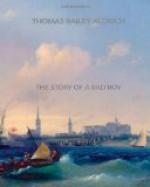“I say,” whispered Fred Langdon, at length, clutching my hand, “don’t you see things—out there—in the dark?”
“Yes, yes—Binny Wallace’s face!”
I added to my own nervousness by making this avowal; though for the last ten minutes I had seen little besides that star-pale face with its angelic hair and brows. First a slim yellow circle, like the nimbus round the moon, took shape and grew sharp against the darkness; then this faded gradually, and there was the Face, wearing the same sad, sweet look it wore when he waved his hand to us across the awful water. This optical illusion kept repeating itself.
“And I too,” said Adams. “I see it every now and then, outside there. What wouldn’t I give if it really was poor little Wallace looking in at us! O boys, how shall we dare to go back to the town without him? I’ve wished a hundred times, since we’ve been sitting here, that I was in his place, alive or dead!”
We dreaded the approach of morning as much as we longed for it. The morning would tell us all. Was it possible for the Dolphin to outride such a storm? There was a light-house on Mackerel Reef, which lay directly in the course the boat had taken, when it disappeared. If the Dolphin had caught on this reef, perhaps Binny Wallace was safe. Perhaps his cries had been heard by the keeper of the light. The man owned a lifeboat, and had rescued several people. Who could tell?
Such were the questions we asked ourselves again and again, as we lay in each other’s arms waiting for daybreak. What an endless night it was! I have known months that did not seem so long.
Our position was irksome rather than perilous; for the day was certain to bring us relief from the town, where our prolonged absence, together with the storm, had no doubt excited the liveliest alarm for our safety. But the cold, the darkness, and the suspense were hard to bear.
Our soaked jackets had chilled us to the bone. To keep warm, we lay huddled together so closely that we could bear our hearts beat above the tumult of sea and sky.
After a while we grew very hungry, not having broken our fast since early in the day. The rain had turned the hard-tack into a sort of dough; but it was better than nothing.
We used to laugh at Fred Langdon for always carrying in his pocket a small vial of essence of peppermint or sassafras, a few drops of which, sprinkled on a lump of loaf-sugar, he seemed to consider a great luxury. I don’t know what would have become of us at this crisis, if it hadn’t been for that omnipresent bottle of hot stuff. We poured the stinging liquid over our sugar, which had kept dry in a sardine-box, and warmed ourselves with frequent doses.
After four or five hours the rain ceased, the wind died away to a moan, and the sea—no longer raging like a maniac—sobbed and sobbed with a piteous human voice all along the coast. And well it might, after that night’s work. Twelve sail of the Gloucester fishing fleet had gone down with every soul on board, just outside of Whale’s-back Light. Think of the wide grief that follows in the wake of one wreck; then think of the despairing women who wrung their hands and wept, the next morning, in the streets of Gloucester, Marblehead, and Newcastle!




